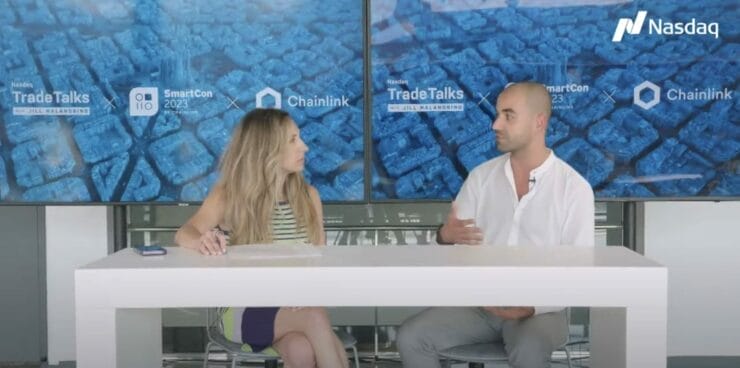SmartCon 2023 featured more than 100 blockchain experts and financial industry leaders including founders of influential protocols in the Chainlink ecosystem. To get a closer look at the future of web3, Nasdaq TradeTalks host Jill Malandrino filmed a two-day interview lineup with speakers at this year’s event in Barcelona, Spain.
Bediss Cherif is Chief Revenue Officer at Kaiko, a leading source of regulatory-compliant cryptocurrency market data which became an official Chainlink node operator in 2019. Cherif sat down with Malandrino to talk about the technology and education needed to drive mainstream adoption of blockchain technology and digital assets.
Coming from a background in traditional finance, Cherif described his early impression of digital assets as paradoxical.
“On the one hand, you have this very fintech environment at the forefront of innovation and very tech savvy,” he said. “But on the other hand, you also have real infrastructure in practice that was extremely weak, error-prone, and that probably needed to leapfrog to where capital markets are if we are to rely on those services tomorrow for financial purposes.”
Chainlink solves the blockchain oracle problem by connecting secure but siloed blockchain environments to decentralized external data needed to execute smart contracts without susceptibility to a single point of failure. Referencing Chainlink co-founder Sergey Nazarov’s SmartCon fireside chat with former Google CEO and Chairman at Steel Perlot, Eric Schmidt, Cherif said Kaiko’s focus is satisfying the growing need for verifiable onchain data in the age of AI and LLMs.
“We’re trying to bring, onchain and in the digital asset ecosystem, reliable and trusted information and equally, the other way around, bring from the blockchain ecosystem and environment that data out to capital markets,” he said.
When it comes to building a verifiable web, Cherif believes an often overlooked but critical component is finding and developing top-tier talent.
“It’s like having a very advanced car that needs a lot of care versus the previous world where everything is more mechanical,” he explained. “I think we need to be a lot more careful about keeping our talents and nurturing them in this industry more than any other.”
Beyond data provenance, cross-chain interoperability, and technical talent, Cherif believes early education is vital to web3 adoption.
“We don’t, I think, put enough importance into educating the next generation for whom all of this is going to be native,” he said. “And we don’t even know what all of this is going to become, but we need to embark them on the journey very early on, because education’s pace is not the same as the technology’s, which is extremely high-speed.”
Watch Jill Malandrino’s full interview with Bediss Cherif.


